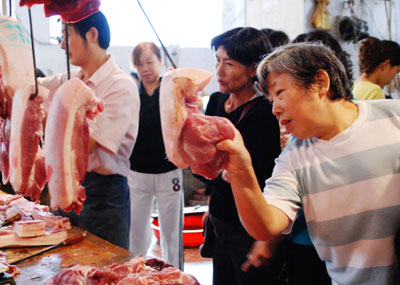5th interest rate hike to drain excessive liquidity
Updated: 2007-09-15 08:23
|
||||||
The People's Bank of China, the central bank, raised the one-year benchmark deposit rate by 27 basis points to 3.87 percent and the one-year lending rate by the same amount to 7.29 percent, effective from September 15, said a statement on the bank's website.
It is the second interest rate hike in less than a month taken by China's central bank, as the country is trying to contain soaring inflation that reached 6.5 percent in August, the fastest increase in a decade. The last interest rate hike was on August 21.
 Consumers shop for pork at a market in Yunyang County, Southwest China's Chongqing Municipality, September 14, 2007. [newsphoto] |
"The move was predictable," BNP Paribas Peregrine Securities chief economist Chen Xingdong said. "Over the past months, the central bank has been trying to check the rising prices of consumer products, which now is the biggest concern of the government."
The rising consumer price index is being driven mostly by food staples such as pork, beef, and eggs but the world financial market analysts are watching closely to see whether the rising inflation will spill over into other sectors, such as manufactured goods, in which China has helped slow the rate of price rises in the world market.
As well as raising interest rates, the central bank has lifted seven times this year the amount that banks must hold with it -- the so-called reserve requirement ratio.
Most recently, on September 6, it said that the ratio would be raised by another 50 basic points to 12.5 percent of each commercial bank's deposits.
The supply of money grew 18.09 percent in August, exceeding the central bank's annual target of 16 percent for the seventh consecutive month. And urban fixed-assets investment rose 26.7 percent in the first eight months of the year.
Chinese central bankers and economists are especially worried about the excessive liquidity in the Chinese economy, which is further fed by a rising foreign trade surplus.
Wu Xiaoling, deputy-governor of the central bank, said on Friday that Chinese banks were not heeding the central bank's directives to slow lending growth.
Banks are lending out money much faster than the central bank's target, with new loans reaching 3,080 billion yuan (US$410 billion) in the first eight months of the year, 97 percent of the total for the whole of last year.
Analysts expect the government to continue raising interest rates and lifting the reserve rate requirement in the coming months as well as issuing more bonds to drain liquidity from the financial system.
Given the latest macro developments, analysts said Friday's interest rate increase might not be the last this year. The central bank could raise it again in October, Chen Xindong said.
Chen felt Friday's interest rate hike will have very limited impact to deflate growing bubbles in the property and equity markets.
"Even after the interest rate increase, the real deposit rate remains in negative territory. Since people still fear higher inflation in the following months, they will invest more in stocks or the property market," Chen said.
But China Jianyin Investment Securities Co senior analyst Li Zhikun disagreed. Given the series of money tightening moves, fixed-assets investment will finally be curbed, he said.
This in turn could slow down public companies' growth prospects and help cool down the stock market in the long run.
|
|
|
||
|
||
|
|
|
|



